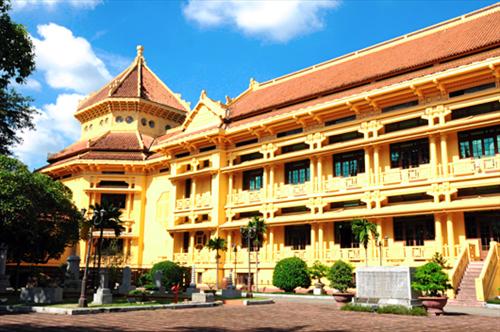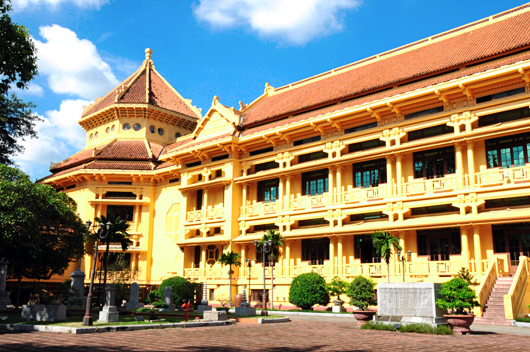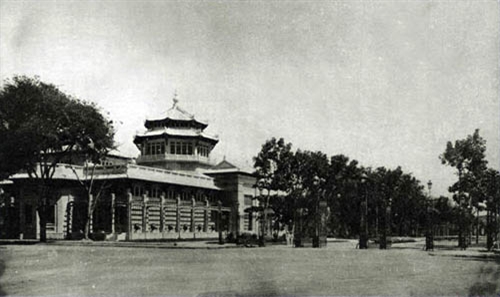

The ancient Far Eastern Institute, now the National Museum of Vietnamese History.
First Research Institutein Indochina
In 1898, Governor-General of Indochina Paul Doumer signed a decision to establish an Oriental research agency called the “Permanent Archaeological Mission in Indochina”. In 1900, this agency was renamed the “French School of the Far East”, abbreviated as EFEO. In 1901, French President Émile Loubet signed a decree officially confirming the establishment of the Institute with the main function of scientific research on history, archaeology, language, ethnology, geophysics and geoanthropology in the Indochina peninsula and countries in the Far East.
On September 8, 1945, just six days after the declaration of independence of the Democratic Republic of Vietnam, the President of the Provisional Government issued Decree No. 13 on the merger of the École Française d'Extrême-Orient into the Ministry of National Education. On November 23, 1945, President Ho Chi Minh signed Decree No. 65 establishing the "Oriental School of Archeology" to replace the "French School of Archeology of the Far East", with the task of preserving and storing the research achievements of the EFEO throughout Vietnam. The above decrees showed the special interest of the Provisional Government in Vietnamese social sciences and humanities, and at the same time affirmed the scientific values that the École Française d'Extrême-Orient had contributed to the study of history, culture as well as the work of preserving heritage for Vietnam in the previous half century.
It can be said that in its journey through the 20th century, the EFEO has experienced many ups and downs along with the changes of Vietnamese history. However, regardless of the certain influence of the colonial government (from its establishment until the August Revolution of 1945), EFEO still maintained its scientific goals to achieve brilliant achievements in scientific research, publishing and conservation.
During the short period alongside the Democratic Republic of Vietnam (September 1945 - December 1946), the flexible policy of the Vietnamese government created conditions for EFEO to have administrative autonomy and manage its headquarters. During the next 10 years (1947-1957), EFEO encountered many difficulties due to the inability of France and the colonial government of Indochina to provide regular funding and the shortage of French researchers in Vietnam. After the Geneva Agreement in 1954, EFEO moved its headquarters to Saigon. And in 1960, EFEO officially closed, ending more than 6 decades of operation in Vietnam. In 1993, EFEO re-established its representative office in Hanoi. Currently, in addition to its headquarters in Paris (France), EFEO also has 18 centers in 12 countries, including 2 representative offices in Vietnam, both in Hanoi and Ho Chi Minh City.

French School of the Far East - French research center on Indochina in South Vietnam in 1926
Great contribution to the formation of Vietnamese Social Sciences and Humanities
EFEO has made very important contributions to the formation and development of the social sciences and humanities in Vietnam. Many of EFEO's research works on history, language, literature, ethnology, religion, and archaeology have been published in Vietnam and around the world. Thousands of historical and cultural works are well managed and preserved by EFEO, including areas that have become world cultural heritages such as My Son Sanctuary in Quang Nam. EFEO is the most solid bridge among many bridges of knowledge connecting Vietnamese academia with the world, especially with France.
EFEO's contributions to Vietnamese Social Sciences and Humanities are reflected in the following typical aspects:contributed to opening up a number of modern social sciences and humanities in Vietnam such as Archeology, Ethnology, Museology, Textology... with groundbreaking discoveries that have scientific value to this day;promote the modernization of traditional social sciences and humanities in parallel with the development of new fields of study;contributing to building a team of international Vietnamese scholars, and at the same time contributing to training a generation of modern Vietnamese social scientists and humanities in the 20th century;Organized many large research programs and projects on the Neolithic era (Hoa Binh), the Bronze Age (Dong Son, Sa Huynh), ancient kingdoms (Phu Nam, Champa)..., publishedBulletin de L'Ecole Francaise d'Etrême-Orient-BEFEO)and many valuable works such as "Administrative Geography of Kinh Bac" (1996), "Vietnamese Taboo Words Through Dynasties" (1997), "Literature and Poetry of Dong Kinh Nghia Thuc" (1997), "L'Univers des Nom Stories" (1998), "Issues of Textual Studies of Nguyen Trai's Military Command" (1999), "Place Names and Archival Documents on Bac Ky Villages" (1999)... Besides the fireEFEO makes practical contributions to the collection and preservation of antiques, the construction of modern museums, and the field of heritage management in Vietnam.
In recent years, EFEO has effectively contributed to introducing new research trends, new perspectives and scientific schools, thereby contributing to promoting the development of Vietnam's social sciences and humanities. In this context, the University of Social Sciences and Humanities - as the leading center for social sciences and humanities research in Vietnam - has closely cooperated with EFEO in many academic activities such as: organizing research programs on villages in the Red River Delta, organizing seminars in the Red River Delta, organizing seminars on theories and methods of modern historical research... These cooperative activities aim at the goal of building and developing Vietnam's social sciences and humanities in the direction of innovation, modernization and international integration.
Author:ussh
Newer news
Older news